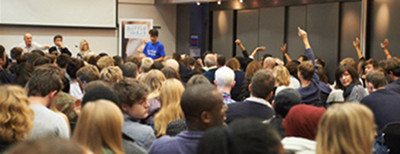
events archive
Is the Big Society good for society?
The one thing everybody seems to agree about the Big Society is that they don’t really know what it is.

The one thing everybody seems to agree about the Big Society is that they don’t really know what it is. Is it about individual liberty and freedom from overweening government, or something to do with rebuilding community and reforming public services? Though it failed to resonate during the General Election, there has been considerable interest since as the new government prepares the way for public spending cuts. For Cameron, the Big Society reflects his ‘profound faith in my fellow human beings and a healthy awareness of the state’s limitations’. Too much government is inhibiting, he says, it can have the effect of ‘undermining social and personal responsibility’, and end up ‘making things worse’ not better. The ‘state will assume a new role as an agitator for social renewal’, he says. Public services will be ‘cheaper to deliver… while bringing communities together. It might even restore people’s trust in the political process’, he says.
But is the Big Society really the new ‘big idea’ that Cameron claims it is, or have we heard it all before? The National Citizen Service, the Big Society Bank, and ‘army of community organisers’, are arguably no more than a reframing of New Labour initiatives around volunteering and ‘community’. In the run up to the election, and after ‘double-devolution’ and the Big Conversation, the Labour government said the ‘moment for mutualism’ had come, and ‘Co-operative Councils’ were handing over assets to the community and people running services for themselves. Nevertheless, the rise of social enterprise, ‘co-production’ and the mutualisation of public services, does seem to speak to the old fashioned notion that people can come up with their own solutions to problems and that government doesn’t need to step in all the time. Whether its parents running their own schools, people paying for social services using personal budgets, nurses starting up their own cooperatives, or concerned locals managing parks and electing police authorities.
Perhaps it has always been little more than a smokescreen for official inertia, and an excuse for the failure to provide decent public services. But it could also be an opportunity, not just for social innovators to inject a bit of life back into the public sector, but for the rest of us to claim the Big Society for ourselves. For all Cameron’s supposed ‘faith’ in individuals to get on with their lives free from state interference, illiberal initiatives persist. Whether it’s policing our parenting abilities, our behaviour online, or our unhealthy lifestyles offline, the state is never far away. If the autonomy of individuals to make decisions for themselves and live their lives as they choose is in doubt, then so it’s the Big Society. On the other hand, shouldn’t we be questioning the eagerness of politicians to ‘hand over the keys’? And should we be turning our backs on post-war achievements like the NHS, social housing or a universal education? Should civil society be expected to fill the gaps as public services are cut, and ‘do-it-yourself’ services put in their place? Perhaps in times like these we need Big Government, and a Big Politics to match?
SPEAKER(S)
Introduced by Dave Clements
READINGS
Ten Big Questions about the Big Society, Anna Coote, nef, June 2010
Building the Big Society, Cabinet Office, 18th May 2010
How Social Entrepreneurs can help build a Trust-Based Big Society, Nick Temple, School for Social Entrepreneurs, 30th June 2010



SHARE THIS